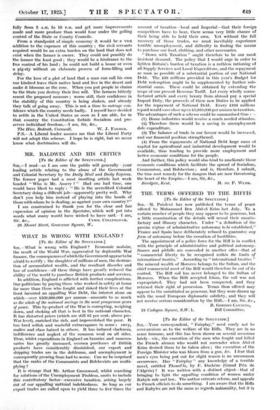WHAT IS WRONG WITH ENGLAND ?
[To the Editor of the SPECTATOR.] SIR, What is wrong with England ? Economic malaise, the result of the World War, aggravated by deplorable War finance, the consequences of which the Government appear to be afraid to rectify ; the slaughter of millions of men, the destruc- tion of accumulated wealth, and the resultant disorder and loss of confidence—all these things have greatly reduced the ability of the world to purchase British products and services.
In addition, England is afflicted with further complications. Our politicians by paying those who worked in safety at home far more than those who fought and risked their lives at the front incurred an appalling War Debt, the interest alone on which—over £300,000,000 per annum—amounts to as much as the whole of the national savings in the most prosperous years of peace. This by-product of the War is corrupting, weighing down, and choking all that is best in the national character. It has distorted prices (which are still 85 per cent. above pre- , War level), enriched the rich, and impoverished the poor. It has bred selfish and wasteful extravagance in some : envy, malice and class hatred in others. It has induced Blackness, indifference and neglect of the common weal on all sides. Thus, whilst expenditure in England on luxuries and unneces- saries has greatly increased, oversea purchases of British products have considerably diminished, our export and' shipping trades are in the doldrums, and unemployment is consequently growing from bad to worse. Can we be surprised that the ranks of the Communists and Bolshevists are multi-
plying
- It is strange that Mr. Arthur Greenwood, whilst searching for solutions of the Unemployment 'Problem, omits to include this contributory factor—excessive taxation,' arising largely Out of our appalling' natitthal indebtedneis. So long as our - ,export trades are called upon to yield three to fivetimes the '
amount. of taxation—local. and Imperial—that their foreign competitors have to bear, there seems very little chance of their being able to hold their own. Yet without the full recovery of those trades, we must inevitably experience terrible unemployment, and difficulty in finding the means to purchase our food, clothing, and other necessaries.
" Down with Taxation " ought therefore to be our most insistent demand. The policy that I would urge in order to lighten Britain's burden of taxation is a ruthless rationing of all Supply Services and Local Expenditure, and the repayment as soon as possible of a substantial portion of our National Debt. The, £50 millions provided in this year's Budget for Debt redemption ought to be supplemented by further sub- stantial sums. These could be obtained by extending the scope of our present Revenue Tariff. Let every wholly manu- factured article and every luxury from abroad pay a special Import Duty, the proceeds of these new Duties to be applied for the repayment of National Debt. Every £100 millions repaid would save close upon £5,000,000 per annum in taxation. The advantages of such a scheme could be summarised thus :- (1) Home industries would receive a much needed stimulus.
(2) Therefore there would be a saving in unemployment dole expenditure.
(3) The balance of trade in our favour would be increased, and our financial position strengthened.
(4) From the repayments of National Debt large sums of capital for agricultural and industrial development would be available, thus tending to provide more employment and better economic conditions for the people.
And further, this policy would also tend to ameliorate those economic conditions which facilitate the spread of Socialism, Communism, and Bolshevism ; and is, therefore, I submit, the true root remedy for the dangers that are now threatening the heart of the Empire.—I am, Sir, &c.,


















































 Previous page
Previous page